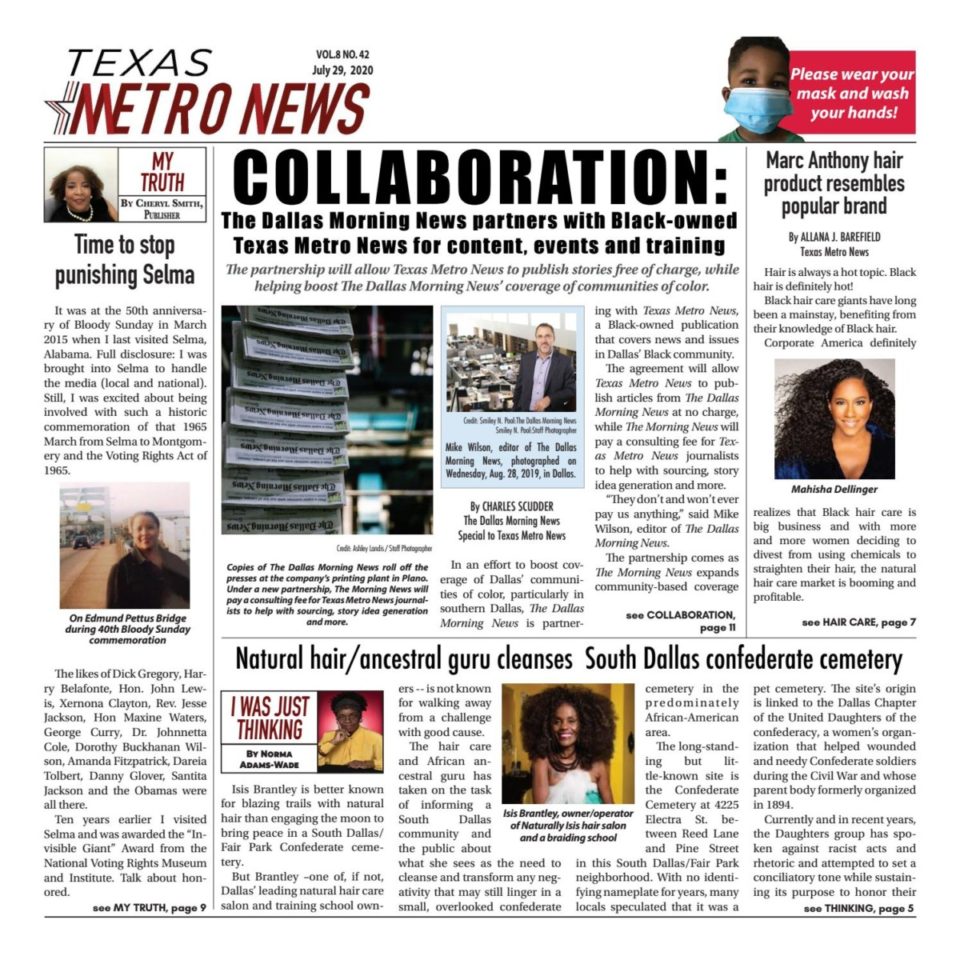And Can the Favor Be Returned?
Support Journal-isms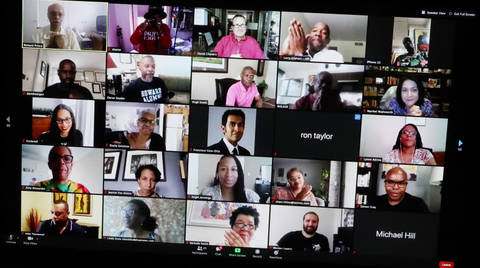
And Can the Favor Be Returned?
The newspaper industry is looking at a partnership between the Dallas Morning News and one of Dallas’ Black newspapers as a model to be replicated as the industry grapples anew with diversity and inclusion.
Dallas’ example “can be replicated well in lots of different communities,” David Chavern, president and CEO of the News Media Alliance, the news industry’s largest trade organization, told the Journal-isms Roundtable. “Part of what I want to take on is putting together a how-to manual for publishers to replicate that in various places.”
Two months ago, the Dallas Morning News and the Texas Metro News, a Black-owned publication that covers Dallas’ Black community, announced a partnership that allows Texas Metro News to publish articles from the Morning News at no charge, while the Morning News pays a consulting fee for Texas Metro News journalists to help with sourcing, story idea generation and more.
On Saturday, for example, the Texas Metro News ran a story from the Morning News about Mahisha Dellinger, who started a multimillion-dollar hair care company with $30,000 of her savings and is about to appear virtually at a Dallas “Women of Innovation” program.
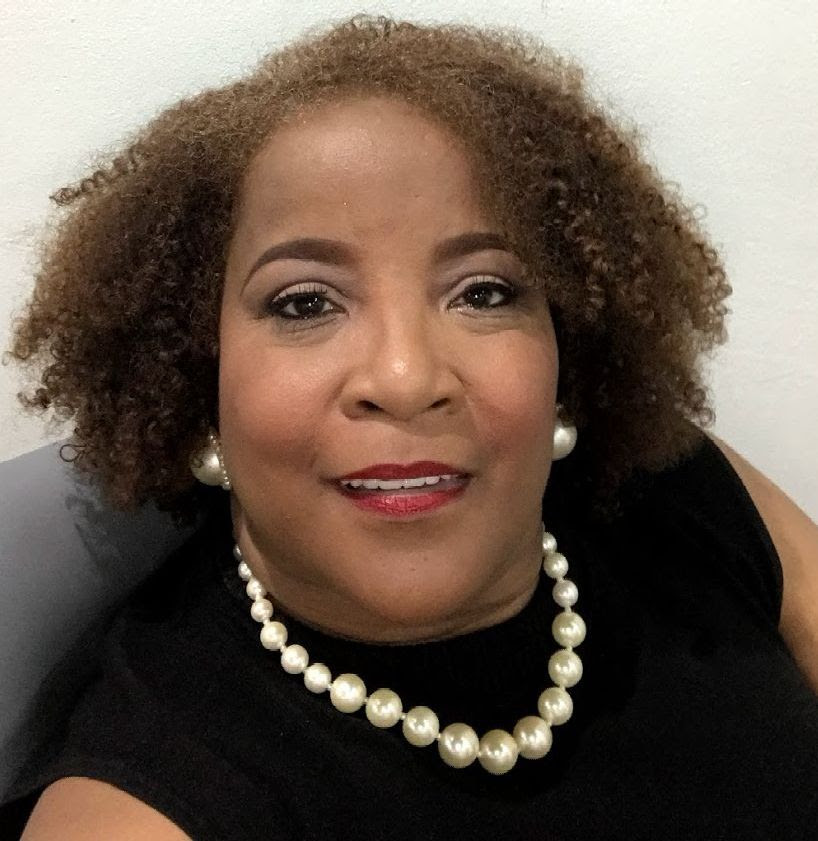 “While we are in the infancy stages of the collaboration, we’ve already gotten so much accomplished,” Cheryl Smith (pictured), editor and publisher of Texas Metro News, messaged Journal-isms on Sunday. “Staffers on both sides are excited about the partnership and realize that it is a mutually beneficial relationship. There is a total commitment on both sides and it is important to note that this collaboration is not window dressing or a PR campaign. We are all legitimately committed to quality journalism and serving our audiences/communities.
“While we are in the infancy stages of the collaboration, we’ve already gotten so much accomplished,” Cheryl Smith (pictured), editor and publisher of Texas Metro News, messaged Journal-isms on Sunday. “Staffers on both sides are excited about the partnership and realize that it is a mutually beneficial relationship. There is a total commitment on both sides and it is important to note that this collaboration is not window dressing or a PR campaign. We are all legitimately committed to quality journalism and serving our audiences/communities.
“I could talk all day long about why it should be emulated. . . . If other news organizations are serious about building, growing and serving their audiences (ALL AUDIENCES); they could learn from The Dallas Morning News and Texas Metro News.”
Mike Wilson (pictured), editor of the Morning News, agrees.
 “Our collaboration is going beautifully, from my point of view,” Wilson messaged on Monday. “My staff and Cheryl’s meet regularly to discuss stories and sourcing. The Texas Metro News team has helped us refine story ideas and connected us with useful sources. Meanwhile, The Dallas Morning News does in-house training on a range of subjects from reporting skills to self-care for reporters, and our TMN colleagues have attended many of the training sessions.
“Our collaboration is going beautifully, from my point of view,” Wilson messaged on Monday. “My staff and Cheryl’s meet regularly to discuss stories and sourcing. The Texas Metro News team has helped us refine story ideas and connected us with useful sources. Meanwhile, The Dallas Morning News does in-house training on a range of subjects from reporting skills to self-care for reporters, and our TMN colleagues have attended many of the training sessions.
“We haven’t shared a lot of content yet but look forward to doing so. We’re also excited about co-sponsoring events, and now our marketing team is working with TMN to create some house ads they need. So there’s a lot more we can still do together.
“I highly recommend this kind of collaboration to other news organizations. Working with TMN has improved our journalism and helped us show our commitment to covering the Black community better than we have in the past.”
Newspaper publishers have been fighting losses of income as “publisher pursuit of revenue during the coronavirus-induced recession becomes increasingly fraught,” as Lucinda Southern reported Sept. 7 for Digiday. The publishers are crying foul as Facebook and Google siphon off advertising revenue, without much of the public realizing that the news content on those platforms largely comes from news organizations, not those tech giants.
The Black press also feels the pinch. In 2016, the National Newspaper Publishers Association, representing the Black press, called out Facebook as the latest threat to its existence, declaring that because of its inscrutable choices about what stories to display, “Our readers are at the mercy of powers unheard and unseen as never before.”
Meanwhile, the racial reckoning prompted by the Memorial Day police killing of George Floyd in Minneapolis has ensnared the news media as well. The United States is expected to become “majority minority” by 2044, but the industry’s declared aspirations to have the percentage of journalists of color reach parity with the percentages in the general population have failed.
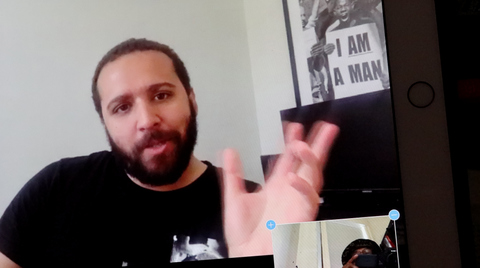 It was against this backdrop that 46 journalists met by Zoom at the Journal-isms Roundtable on the Sunday afternoon of Sept. 13, with 263 more on Facebook Live. Joining Chavern and the other participants were Maribel Perez Wadsworth, publisher of USA Today and president of news for Gannett Co., and Wesley Lowery (pictured, by Sharon Farmer/sfphotoworks), correspondent for 60 Minutes’ “60 in 6” on Quibi. You can watch the video here.
It was against this backdrop that 46 journalists met by Zoom at the Journal-isms Roundtable on the Sunday afternoon of Sept. 13, with 263 more on Facebook Live. Joining Chavern and the other participants were Maribel Perez Wadsworth, publisher of USA Today and president of news for Gannett Co., and Wesley Lowery (pictured, by Sharon Farmer/sfphotoworks), correspondent for 60 Minutes’ “60 in 6” on Quibi. You can watch the video here.
We also celebrated the promotions of Angel Jennings and Kimbriell Kelly at the Los Angeles Times, the result of an internal uprising by Black and Latino journalists, and the retirement of Linda Shockley as managing director of the Dow Jones News Fund.
Participants said the Dallas partnership was not the only one that might be emulated.

In Sacramento, Calif., for example, the Bee collaborates with community organizations such as Black Zebra, Larry Graham, formerly of the Union Tribune in San Diego, noted.
“Our community partners at Sol Collective, along with contributing writers to Community Voices, urged us to connect with Black Zebra,” Ryan Lillis, assistant managing editor of The Sacramento Bee, wrote this month for Better News. “During the first few days of anti-police brutality protests in Sacramento, two members of the Black Zebra crew were detained by police as its members produced Facebook Live videos. We connected with them, signed them to produce a documentary for us and, in the process, issued the crew Sacramento Bee press credentials.”
In Miami, the Miami Herald collaborates with the MIA Media Group, which publishes three versions of the Black magazine Legacy: Legacy Miami, Legacy South Florida and MIA Lifestyle. The MIA Media Group pays both the Herald and the South Florida SunSentinel to distribute Legacy as an insert in their newspapers. Legacy publishes only positive material, editor-in-chief Russell Motley told Journal-isms.
Attendees also came forward with links to studies demonstrating the business case for diversity, such as “Diversity wins: How inclusion matters” by McKinsey and Co. [PDF] and “Toward a Racially Just Workplace,” published last fall in the Harvard Business Review.
Virgil Smith, former publisher and business-side executive for McClatchy and Gannett, implored the New Media Alliance members to “pool their resources for some type of development program, [a] pipeline of diverse talent for senior positions in our industry. NAB, the National Association of Broadcasters, has done this very successfully for a number of years with their program to create ownership opportunities for people of color to own their own TV stations, and if they didn’t own their own TV stations, to become a senior leader, a general manager. . . . ” The 10-month executive MBA-style program also includes women.
“This is something I think the media alliance is in a position to do. A commitment to diversity means developing top talent, because if you bring in, with all due respect to the journalists, just reporters, things are not going to change.
“You really need decision makers such as Maribel, at the top of the food chain, to help, really make things change. And so I’m imploring you to consider that. The resources are there, there are partnerships with universities, other institutions, such as Harvard and others, who I’m sure would be happy to work with you in developing such a program.”
Wadsworth, of Gannett, said of diversity progress, “I hear people say it’s hard. Well, I don’t know of a lot of things that aren’t hard in this world, but it’s obviously important, and it’s, I believe, a choice.” Last month Gannett, the owner of USA Today and 266 local news operations, announced a broad initiative to make its workforce as diverse as the country by 2025 and to expand the number of journalists focused on covering issues related to race and identity, social justice and equality.
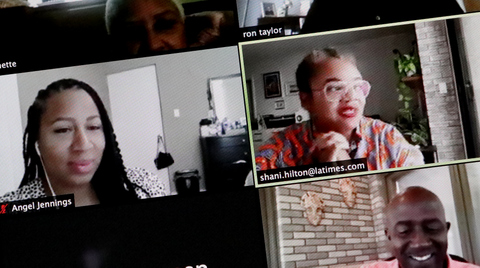
The conversation turned to the frustrations of black journalists in newsrooms and how the journalists have been emboldened by the reckoning. Lowery, who left the Washington Post this year for CBS News, said he speaks out partly to provide cover for others. In June, Lowery wrote an opinion piece in The New York Times in which, he explained, he had argued that outdated notions of “objectivity” have been distorted. It was a concept that applied broadly to the profession, but is now one used against individual Black journalists, he said.
Greg Moore, former editor of the Denver Post, said that the coronavirus forcing journalists to work from home negatively affected diversity as well. Moore cited “the combustion of collaborating with other people,” saying that the newsroom “invites other voices to be part of the process. And not having a newsroom I think really does undercut the impact of diversity. When those conversations are happening in silos, the opportunity to be invited into those conversations is severely diminished.”
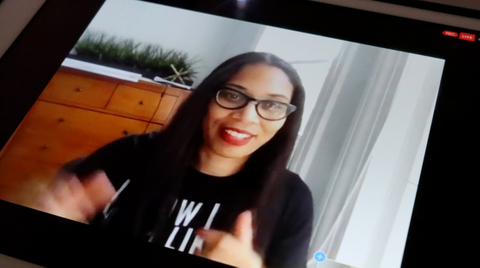 Kimbriell Kelly (pictured, by Sharon Farmer/sfphotoworks), newly promoted as Washington bureau chief of the Los Angeles Times, recalled her surprise in joining the bureau from The Washington Post a year ago. She was the new deputy editor for enterprise and investigations. “We have about 28 people in our office here in Washington, and I remember walking in my office my first day, and I said, ‘Whoa! Where are the brown reporters?’ And the reality was that our office, in spite of the fact that we cover Washington for our L.A. audience . . . that we don’t have a single Black reporter or a single Latino reporter, despite the fact of the racial makeup of L.A., where the vast majority are people of color.
Kimbriell Kelly (pictured, by Sharon Farmer/sfphotoworks), newly promoted as Washington bureau chief of the Los Angeles Times, recalled her surprise in joining the bureau from The Washington Post a year ago. She was the new deputy editor for enterprise and investigations. “We have about 28 people in our office here in Washington, and I remember walking in my office my first day, and I said, ‘Whoa! Where are the brown reporters?’ And the reality was that our office, in spite of the fact that we cover Washington for our L.A. audience . . . that we don’t have a single Black reporter or a single Latino reporter, despite the fact of the racial makeup of L.A., where the vast majority are people of color.
“The situation I walked into, I was like, ‘OK I need to help fix this, even though this isn’t my job.’ And so in this last year I’ve made it a point of mine to bring in interns, a Black intern and a Latino intern to help us. I brought in a Metpro [training program] person, the first Metpro from what I understand who’s actually worked in our office is an African American and now she’s actually beginning a stint on Opinions, which is writing things that are really speaking to our audience. And I also hired an investigative reporter into our office who is Asian, who was born in China. . . .”
The roundtable closed with a question about how journalists of color should deal with microaggressions.
“Surround yourself with the community,” said Kelly. I’m lucky that I get to now have [Deputy Managing Editor] Shani [Hilton] as my boss and it was funny. On the day they were going to make the announcement, she calls me up like about 10 minutes before the announcement and said, ‘Hey, just checking on you to see how you’re doing.’
“1. The fact that she did that and that a Black woman had done that meant the world to me. But then when she asked, like, ‘what are you doing right now?’ And I was actually, like wrapping my hair. And I was putting my Eco Styler on, and I was like tying it down. And there was like something in that moment, I actually told her. I actually had [told] a boss that I was putting Eco Styler in my hair and I had a head wrap on. And that meant a lot to me.
“And anybody who’s a person of color, most people don’t get that opportunity, to . . . acknowledge the hardships that we’re having right now. Surround yourself with people who understand you and support you. Seek out opportunities where you can actually have mentors around you. People [who will be supportive] like Shani has been to me. Or others inside your organization or outside of it.”
- Cierra Hinton, Lewis Raven Wallace and Manolia Charlotin, Nieman Reports: Journalism Must Be an Act of Community-Building
- Michael Kilian, Cynthia Benjamin and Len LaCara, Better News: How the Rochester Democrat and Chronicle forged relationships with communities of color (June 2020)
To subscribe at no cost, please send an email to journal-isms-subscribe@yahoogroups.com and say who you are.
Facebook users: “Like” “Richard Prince’s Journal-isms” on Facebook.
Follow Richard Prince on Twitter @princeeditor
Richard Prince’s Journal-isms originates from Washington. It began in print before most of us knew what the internet was, and it would like to be referred to as a “column.” Any views expressed in the column are those of the person or organization quoted and not those of any other entity. Send tips, comments and concerns to Richard Prince at journal-isms-owner@yahoogroups.com
View previous columns (after Feb. 13, 2016).
- Diversity’s Greatest Hits, 2018 (Jan. 4, 2019)
- Book Notes: Is Taking a Knee Really All That? (Dec. 20, 2018)
- Book Notes: Challenging ’45’ and Proudly Telling the Story (Dec. 18, 2018)
- Book Notes: Get Down With the Legends! (Dec. 11, 2018)
- Journalist Richard Prince w/Joe Madison (Sirius XM, April 18, 2018) (podcast)
- Richard Prince (journalist) (Wikipedia entry)
- February 2018 Podcast: Richard “Dick” Prince on the need for newsroom diversity (Gabriel Greschler, Student Press Law Center, Feb. 26, 2018)
- Diversity’s Greatest Hits, 2017 — Where Will They Take Us in the Year Ahead?
- Book Notes: Best Sellers, Uncovered Treasures, Overlooked History (Dec. 19, 2017)
- An advocate for diversity in the media is still pressing for representation, (Courtland Milloy, Washington Post, Nov. 28, 2017)
- Morgan Global Journalism Review: Journal-isms Journeys On (Aug. 31, 2017)
- Diversity’s Greatest Hits, 2016
- Book Notes: 16 Writers Dish About ‘Chelle,’ the First Lady
- Book Notes: From Coretta to Barack, and in Search of the Godfather
- Journal-isms’ Richard Prince Wants Your Ideas (FishbowlDC, Feb. 26, 2016)
- “JOURNAL-ISMS” IS LATEST TO BEAR BRUNT OF INDUSTRY’S ECONOMIC WOES (Feb. 19, 2016)
- Richard Prince with Charlayne Hunter-Gault,“PBS NewsHour,” “What stagnant diversity means for America’s newsrooms” (Dec. 15, 2015)
- Book Notes: Journalists Follow Their Passions
- Book Notes: Journalists Who Rocked Their World
- Book Notes: Hands Up! Read This!
- Book Notes: New Cosby Bio Looks Like a Best-Seller
- Journo-diversity advocate turns attention to Ezra Klein project (Erik Wemple, Washington Post, March 5, 2014)
.

